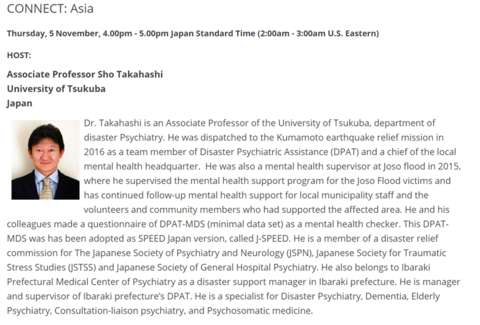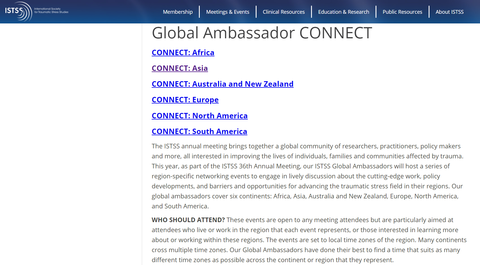公開日 2020年12月22日
国際交流委員会からのお知らせです。
高橋晶理事による国際トラウマティック・ストレス学会(ISTSS)大会の報告、欧州トラウマティック・ストレス学会(ESTSS)の企画、論文の動向をお伝えします。
●第36回国際トラウマティック・ストレス学会(ISTSS)におけるGlobal Ambassadorとしての役割と経験(筑波大学 医学医療系 災害・地域精神医学 高橋 晶)
今回、第36回国際トラウマティック・ストレス学会(ISTSS)はCOVID-19の影響を受け、初めての完全オンライン開催となりました。今回、アジア連携担当としての経験をしたので簡単にご報告させていただきます。
オンライン開催となり、ライブ配信については2020年11月4日から14日までの間に,アトランタ時間(東部時間)で10時から18時過ぎまで行われました。日本からは時差の関係でライブ参加は日本時間では、深夜0時スタートで,毎日0時から朝8時過ぎまでですので、ライブ参加はやや難しい点がありました。このため、アジアからの参加は難しい点があったかもしれません。
そして今回、グロ-バルアンバサダー(Global Ambassador)としての貴重な役目を頂いた事を関係者の先生方に感謝いたします。この、グローバルアンバサダーの主な役割は、他のISTSSメンバーとの交流を通じて、会議中にISTSSの公的に宣伝することです。特に、まだ学会に参加し始めの会員や、初めての参加者、ISTSSに関心のある会員に向けてのサポート、発信をする事にあります。今回はCONNECTという、参加者同士のネットワークを広げる為のセッションイベントがありました。https://istss.org/am20/networking-events/connect#asia (CONNECT: Africa、CONNECT: Asia、CONNECT: Australia and New Zealand、CONNECT: Europe、CONNECT: North America、CONNECT: South Americaというように、世界中のエリアでの交流イベントが行われ、各地域での知り合いを増やし、各地域で起きている事を共有し、研究につなげていく話し合いがもたれました。
ここでわたしは、CONNECT: Asiaというイベントの司会的な役割を行いました。
今回は、このようなネットワークイベントをオンライン上で行う事は学会史上初めての開催とのことで、様々な準備が行われました。こちらでは、どのようなアジアの参加者が参加するかわからないことから、自身の紹介、現在アジアの領域で起きているトラウマストレス関連のニュースをまとめ、またCOVID-19に関する事をスライドにまとめて、プレゼンをしてから、開始されました。約1時間のwebイベントでした。参加者は決して多くはなく、今後の課題であると思いましたが、その中でも、インドネシアやネパールから参加がありました。また大江美佐里先生にもご参加していただき、サポートいただき、感謝申しあげます。お一人での飛び込み参加の方もいて、アジアの各地域で起きている対応、雰囲気を感じる事ができ、大変興味深い経験でした。
このコロナ禍では、今後もこのようなオンライン開催が日常化してくると思われます。その中で、アジア、そして世界のネットワークを構築する事にこのようなイベントは非常に有用であると思いました。今回は貴重な経験をさせていただきましたので、皆様にご報告申しあげます。貴重な機会をいただき、この度はありがとうございました。


●ESTSSオンライン・シンポジウム
2021年2月1日の21時から(日本時間)、ESTSSの学会誌European Journal of Psychotraumatologyの発刊10周年を記念して、オンライン・シンポジウム”Celebrating 10 years of the European Journal of Psychotraumatology: Free ESTSS online symposium”が開催されます。ISTSS・ESTSSの専門家たちが登壇し、最先端のトラウマティック・ストレス研究・実践を紹介します。誰でも無料登録のうえ参加が可能ですので、ご興味のある方はご参加ください。
https://think.taylorandfrancis.com/zept-symposium-10-years/
●COVID-19関連論文
COVID-19(新型コロナウイルス感染症)の感染拡大が続く中、科学的知見を一刻も早く広めるため、ほぼ全ての学術誌がCOVID-19関連論文をオープン・アクセスとしています。一般人口や特定の集団(医療従事者など)を対象とした原著論文が破竹の勢いで出版されています。原著論文だけでなく、それをまとめたシステマティック・レビューも続々と刊行されています。Cénatらによる論文55編のシステマティック・レビューとメタアナリシスでは、一般人口におけるPTSD症状の割合は21.9%と報告されています。
Journal of Traumatic Stress(ISTSS学会誌)では、COVID-19のバーチャル特集号を組み、関連論文を掲載しています。中でも注目に値するのは、PTSDにおける遠隔治療と対面治療との比較、そしてCOVID-19罹患がPTSDのトラウマ的出来事に該当するかの議論です。後者については、Karatziasらによる一般人口のPTSD症状を報告した論文に対して、van OvermeireがDSM-5のトラウマ的出来事に該当しないことを指摘しました。これに対して筆者らは、その体験がICD-11の基準を満たすことを示しながら反論しています。
Journal of Traumatic Stress Virtual Special Issue: Trauma and the COVID-19 Global Pandemic. https://onlinelibrary.wiley.com/doi/toc/10.1002/(ISSN)1573-6598.trauma-and-covid-19
Cénat JM et al. Psychiatry Res. 2020. Online ahead of print. https://doi.org/10.1016/j.psychres.2020.113599
Karatzias T et al. J Trauma Stress. 2020;33:365-370. https://doi.org/10.1002/jts.22565
Van Overmeire R. J Trauma Stress. 2020;33:864-865. https://doi.org/10.1002/jts.22594
Shevlin M, Hyland P, Karatzias T. J Trauma Stress. 2020;33:866-868. https://doi.org/10.1002/jts.22592
●日本発信のトラウマ関連論文
2020年後半においても、日本でのトラウマ研究が相次いで刊行されました。今後の臨床・研究において参考になると思いますので、以下にまとめて紹介します。(項目内アルファベット順、#:本学会理事)
【COVID-19関連】
Asaoka H, Koido Y, Kawashima Y, Ikeda M, Miyamoto Y, Nishi D. Post-traumatic stress symptoms among medical rescue workers exposed to COVID-19 in Japan. Psychiatry Clin Neurosci. 2020. Online ahead of print. https://doi.org/10.1111/pcn.13092
Momoi M, Murakami M, Horikoshi N, Maeda M. Dealing with Community Mental Health post the Fukushima disaster: lessons learnt for the COVID-19 pandemic. QJM. 2020;113(11):787-788. https://doi.org/10.1093/qjmed/hcaa213
Shigemura J#, Ursano RJ, Kurosawa M#, Morganstein JC, Benedek DM. Understanding the traumatic experiences of healthcare workers responding to the COVID-19 pandemic. Nurs Health Sci. 2020. Online ahead of print. https://doi.org/10.1111/nhs.12766
Sugaya N, Yamamoto T, Suzuki N, Uchiumi C#. A real-time survey on the psychological impact of mild lockdown for COVID-19 in the Japanese population. Sci Data. 2020;7(1):372. https://doi.org/10.1016/j.jpsychires.2020.06.004
Takahashi S#, Manaka K, Hori T, Arai T, Tachikawa H. An Experience of the Ibaraki Disaster Psychiatric Assistance Team on the Diamond Princess Cruise Ship: Mental Health Issues Induced by COVID-19. Disaster Med Public Health Prep. 2020. Online ahead of print. https://doi.org/10.1017/dmp.2020.305
【東日本大震災・福島第一原発事故関連】
Horikoshi N, Maeda M#, Iwasa H, Momoi M, Oikawa Y, Ueda Y, Kashiwazaki Y, Onji M, Harigane M, Yabe H, Yasumura S. The Usefulness of Brief Telephonic Intervention After a Nuclear Crisis: Long-Term Community-Based Support for Fukushima Evacuees. Disaster Med Public Health Prep. 2020. Online ahead of print. https://doi.org/10.1017/dmp.2020.161
Kawahara K, Ushijima H, Usami M, Takebayashi M. No Associations of Psychological Symptoms and Suicide Risk with Disaster Experiences in Junior High School Students 5 Years After the 2011 Great East Japan Earthquake and Tsunami. Neuropsychiatr Dis Treat. 2020;16:2377-2387. https://doi.org/10.2147/ndt.s269835
Kino S, Aida J, Kondo K, Kawachi I. Persistent mental health impacts of disaster. Five-year follow-up after the 2011 great east Japan earthquake and tsunami: Iwanuma Study. J Psychiatr Res. 2020;S0022-3956(20)30927-4. https://doi.org/10.1016/j.jpsychires.2020.08.016
Kyutoku Y, Dan I, Yamashina M, Komiyama R, Liegey-Dougall AJ. Trajectories of Posttraumatic Growth and Their Associations With Quality of Life After the 2011 Tohoku Earthquake and Tsunami. J Trauma Stress. 2020. Online ahead of print. https://doi.org/10.1002/jts.22628
Nagamine M, Giltay EJ, Shigemura J#, van der Wee NJ, Yamamoto T, Takahashi Y, Saito T, Tanichi M, Koga M, Toda H, Shimizu K, Yoshino A, Vermetten E. Assessment of Factors Associated With Long-term Posttraumatic Stress Symptoms Among 56 388 First Responders After the 2011 Great East Japan Earthquake. JAMA Netw Open. 2020;3(9):e2018339. https://doi.org/10.1001/jamanetworkopen.2020.18339
Orita M, Taira Y, Matsunaga H, Maeda M#, Takamura N. Quality of Life and Intention to Return among Former Residents of Tomioka Town, Fukushima Prefecture 9 Years after the Fukushima Daiichi Nuclear Accident. Int J Environ Res Public Health. 2020;17(18):6625. https://doi.org/10.3390/ijerph17186625
Sanoh T, Eguchi E, Ohira T, Hayashi F, Maeda M#, Yasumura S, Suzuki Y, Yabe H, Takahashi A, Takase K, Harigane M, Hisamatsu T, Ogino K, Kanda H, Kamiya K. Association between Psychological Factors and Evacuation Status and the Incidence of Cardiovascular Diseases after the Great East Japan Earthquake: A Prospective Study of the Fukushima Health Management Survey. Int J Environ Res Public Health. 2020;17(21):7832. https://doi.org/10.3390/ijerph17217832
Takeshita S, Toda H, Tanaka T, Koga M, Yoshino A, Sawamura T. Psychological and physical condition of Japan maritime self-defense force personnel who performed disaster-relief missions after the 2011 great east Japan earthquake. J Psychiatr Res. 2020;130:104-111. https://doi.org/10.1016/j.jpsychires.2020.07.023
Yagi A, Maeda M#, Suzuki Y, Yabe H, Yasumura S, Niwa S, Ohira T, Ohtsuru A, Mashiko H, Harigane M, Nakano H, Abe M; Fukushima Health Survey. Changes in drinking behavior among evacuees after the Fukushima Daiichi Nuclear Power Plant accident: the Fukushima Health Management Survey. Fukushima J Med Sci. 2020. Online ahead of print. https://doi.org/10.5387/fms.2019-24
【災害関連(東日本大震災・福島第一原発事故以外)】
Newnham EA, Dzidic PL, Mergelsberg ELP, Guragain B, Chan EYY, Kim Y#, Leaning J, Kayano R, Wright M, Kaththiriarachchi L, Kato H#, Osawa T#, Gibbs L. The Asia Pacific Disaster Mental Health Network: Setting a Mental Health Agenda for the Region. Int J Environ Res Public Health. 2020;17(17):6144. https://doi.org/10.3390/ijerph17176144
Uemura N, Miyazaki M, Okuda H, Haruyama S, Ishikawa M, Kim Y#. Competency framework, methods, evaluation, and outcomes of disaster preparedness and response training: a systematic scoping review protocol. JBI Evid Synth. 2020. Online ahead of print. https://doi.org/10.11124/jbisrir-d-19-00380
【生物学】
Chiba T, Ide K, Taylor JE, Boku S, Toda H, Kanazawa T, Kato S, Horiuchi Y, Hishimoto A, Maruyama T, Yamamoto T, Shirakawa M#, Sora I, Kawato M, Koizumi A. A reciprocal inhibition model of alternations between under-/overemotional modulatory states in patients with PTSD. Mol Psychiatry. 2020. Online ahead of print. https://doi.org/10.1038/s41380-020-0827-0
Otsuka T, Hori H, Yoshida F, Itoh M, Lin M, Niwa M, Ino K, Imai R, Ogawa S, Matsui M, Kamo T#, Kunugi H, Kim Y#. Association of CRP genetic variation with symptomatology, cognitive function, and circulating proinflammatory markers in civilian women with PTSD. J Affect Disord. 2020;279:640-649.https://doi.org/10.1016/j.jad.2020.10.045
【その他】
Chou PH, Ito M#, Horikoshi M. Associations between PTSD symptoms and suicide risk: A comparison of 4-factor and 7-factor models. J Psychiatr Res. 2020;129:47-52. https://doi.org/10.1016/j.jpsychires.2020.06.004
Fujisato H, Ito M#, Berking M, Horikoshi M. The influence of emotion regulation on posttraumatic stress symptoms among Japanese people. J Affect Disord. 2020;277:577-583. https://doi.org/10.1016/j.jad.2020.08.056
Igarashi N, Aoyama M, Ito M#, Nakajima S#, Sakaguchi Y, Morita T, Shima Y, Miyashita M. Comparison of two measures for Complicated Grief: Brief Grief Questionnaire (BGQ) and Inventory of Complicated Grief (ICG). Jpn J Clin Oncol. 2020.Online ahead of print. https://doi.org/10.1093/jjco/hyaa185
Oe M#, Kobayashi Y, Ishida T, Chiba H, Matsuoka M, Kakuma T, Frewen P, Olff M. Screening for psychotrauma related symptoms: Japanese translation and pilot testing of the Global Psychotrauma Screen. Eur J Psychotraumatol. 2020;11(1):1810893. https://doi.org/10.1080/20008198.2020.1810893
Toyoshima K, Inoue T, Masuya J, Fujimura Y, Higashi S, Tanabe H, Kusumi I. Structural equation modeling approach to explore the influence of childhood maltreatment in adults. PLoS One. 2020;15(10):e0239820. https://doi.org/10.1371/journal.pone.0239820
〈国際交流委員会:大江美佐里、大澤智子、重村淳(委員長)〉
